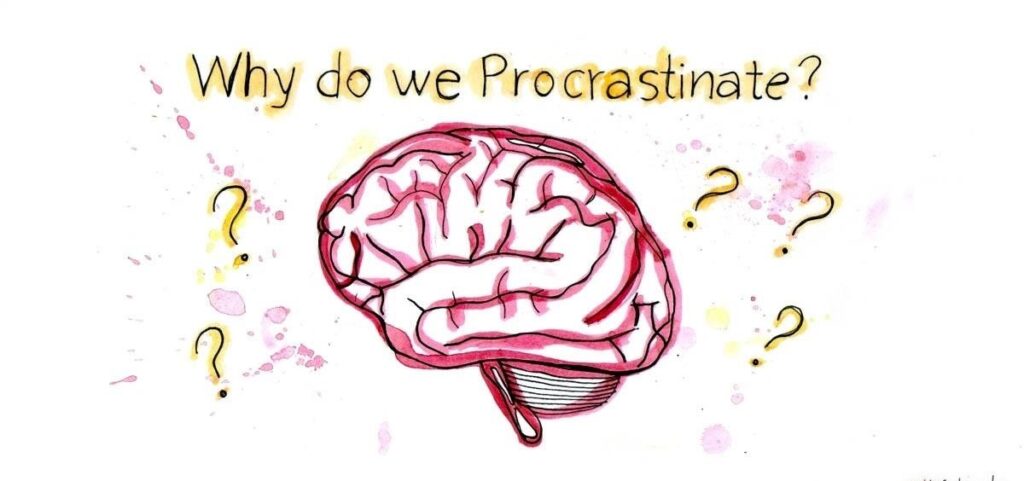It’s 3 am and you’re just now finishing up that project you were supposed to have done two days ago. Sound familiar? If so, you’re not alone. Procrastination is a habit that many of us fall into. But it doesn’t have to be a lifelong habit. In this blog post, we will explore what procrastination is, the different types of procrastination, the reasons behind procrastination (why do I procrastinate so much), and how to beat it down for good!
Contents
Understanding Procrastination
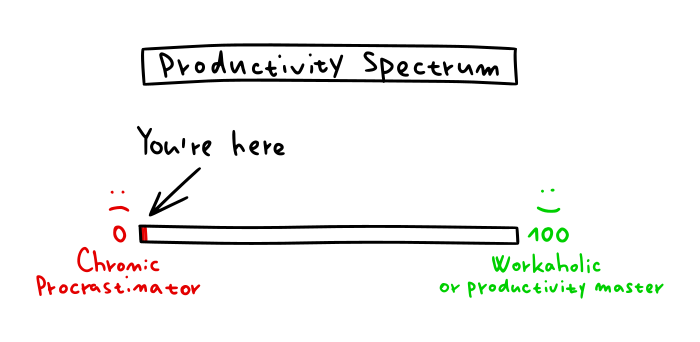
Procrastination is the act of delaying or postponing something. It’s putting off a task that you know you need to do. Procrastinators often feel overwhelmed by a project instead of starting it. Hence, they put it off until later. This can lead to feelings of guilt, anxiety, and stress.
The Procrastination Cycle
There are three steps in the procrastination cycle:
- Preparation: In this stage, you’re getting ready to do the task but haven’t started yet. You may be gathering supplies or doing research.
- Action: This is when you’re doing the task. It’s often the shortest stage.
- Completion: This is when you finish the task. It’s often the longest stage, especially if it’s a challenging or unpleasant task.
Types of Procrastination
There are three main types of procrastination: task-based, emotion-based, and fear-based.
Task-Based Procrastination: This is the most common type of procrastination. It’s when people put off tasks because they don’t know how to start or they’re overwhelmed by the task. They often feel like they’re not good at it or they don’t have enough time.
Emotion-Based Procrastination: This type of procrastination is when people put off tasks because they don’t feel like doing them. They may be tired, stressed, or angry when they should be working. This often leads to avoiding work altogether.
Fear-Based Procrastination: This type of procrastination is when people put off tasks because they’re afraid of failure or looking bad. They may feel like they’re not good enough to do the task or that they don’t know enough.
Reasons Behind Procrastination

There are many reasons why people procrastinate. But, some of the most common reasons are:
Lack of Motivation: This is when a person doesn’t feel like doing the task and they don’t see the point in doing it. They may not be interested in the topic or they find it boring.
Fear of Failure: This is when a person is afraid of not doing well on the task. They may think they’re not good enough or that they’ll make a mistake.
Perfectionism: This is when a person wants everything to be perfect before they start the task. They often have high standards for themselves and can’t stand making mistakes.
Anxiety/Stress: This is when a person is overwhelmed by the task and they don’t know where to start. They may feel like they’re not good enough or that they’ll fail.
Lack of Time: This is often an excuse people use to avoid doing a task. They may think they don’t have time to do it or that it’ll take too long.
Personality Types Prone To Procrastination
Certain personality types are more prone to procrastination. They are:
The thrill-seeker: This is someone who likes the feeling of adrenaline they get from procrastinating. They often do it to avoid boredom or stress.
The Over-Committer: This is someone who takes on too many tasks at once and never finishes them. They often feel overwhelmed and stressed.
The Perfectionist: This is someone who wants everything to be perfect before they start a task. They often have high standards for themselves and can’t stand making mistakes.
The Underestimator: This is someone who doesn’t think they can do a task and, as a result, puts it off. They often have low self-esteem and don’t believe in themselves.
Evaluating Procrastination
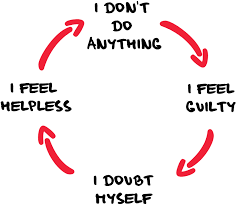
Now that we know the different types of procrastination, let’s take a look at how it’s affecting our lives.
Procrastination can harm our personal life, work-life, and social life.
Impact of Procrastination on Personal Life
Procrastination can harm our personal lives in many ways. It can lead to feelings of guilt, anxiety, and stress. We may also feel like we’re not good enough or that we can’t do it. This can cause us to doubt ourselves and our abilities.
Impact of Procrastination on Work-Life
Procrastination can also harm our work lives. We may feel like we’re not good enough at our job. Or that we don’t have enough time to do it. This can lead to feelings of stress and anxiety. It can also cause us to miss deadlines and get in trouble at work.
Impact of Procrastination on Student Life
Procrastination can also harm student life. We may feel like we’re not good enough in school. Or that we don’t have enough time to do it. This can lead to feelings of stress and anxiety. It can also cause us to miss deadlines and get poor grades.
Impact of Procrastination on Social Life
Procrastination can also harm our social lives. We may not have enough time to see our friends or we may feel too stressed out to go out. This can lead to feelings of loneliness and isolation. It can also cause us to miss out on opportunities for socialization.
Beating Down Procrastination
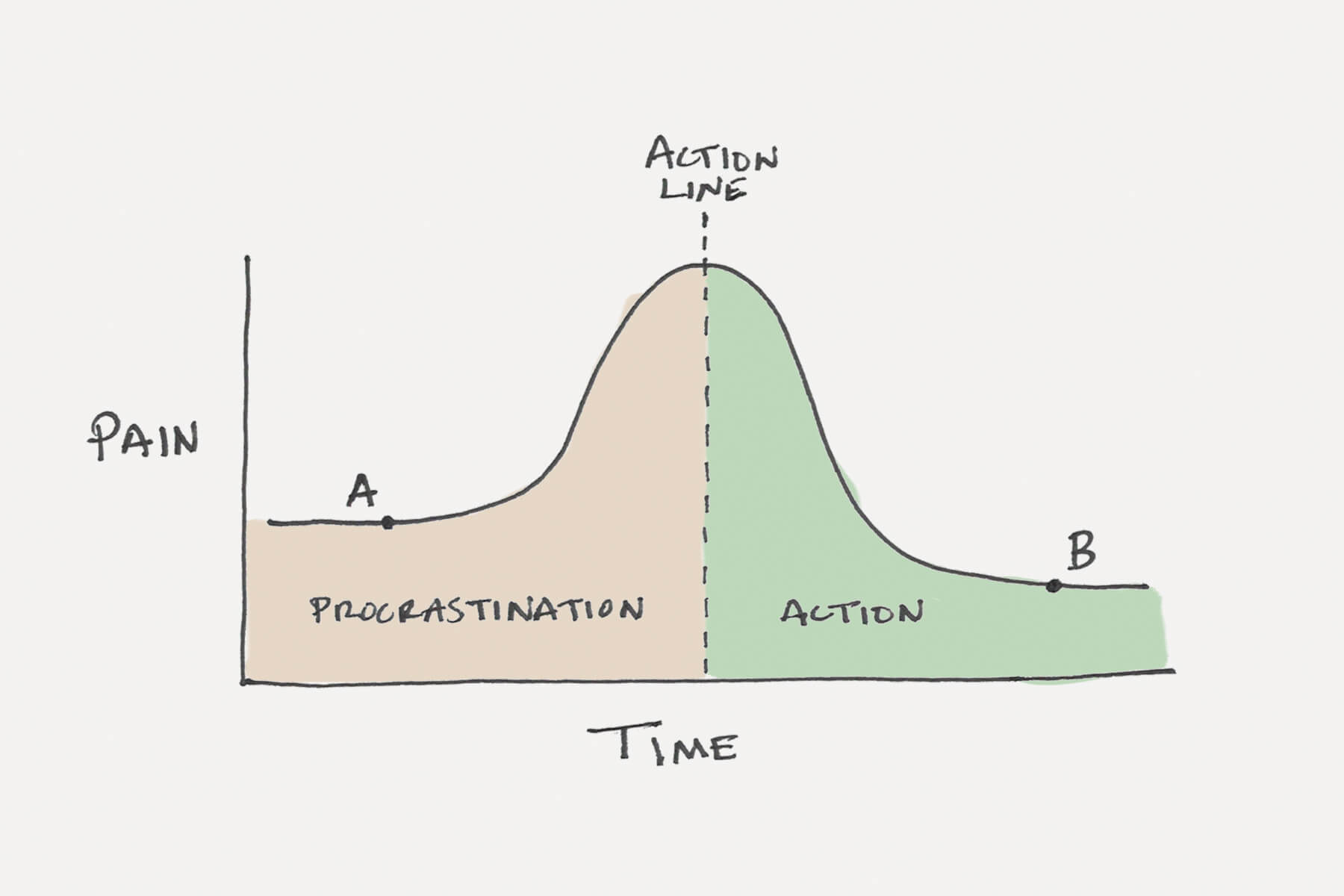
Now that we know the effects of procrastination, let’s look at how we can beat it. There are many self-help tips and tools that can help us overcome procrastination.
Self-Help Tips
Here are some self-help tips for overcoming procrastination:
Set Goals: This can help us stay focused and motivated. When we have a goal, we know what we’re working towards.
Create a To-Do List: This can help us organize our tasks and keep track of what we need to do.
Break Tasks Down into Smaller Chunks: This can make the task seem less daunting and more manageable.
Set a Time Limit: This can help us stay focused and avoid getting overwhelmed.
Use the Pomodoro Technique: This is a time management technique that can help us focus on one task at a time.
Take a Break: This can help us recharge and come back to the task with fresh eyes.
Talk to a Professional: If we’re struggling to overcome procrastination, we can talk to a professional for help.
Self-help Tools
Here are some self-help tools for overcoming procrastination:
Planner: This can help us plan out our day and week.
Notebook: This can help us keep track of our thoughts and ideas.
Charts and Graphs: This can help us track our progress and see how we’re doing.
Timer: This can help us keep track of time and stay focused on the task at hand.
Apps: There are many apps available that can help us with time management, goal setting, and task organizing.
Books and Movies: There are many books and movies about overcoming procrastination. These can be a great source of inspiration and motivation.
Pomodoro Technique
The Pomodoro Technique is a time management technique that can help us focus on one task at a time.
How Does It Work
The Pomodoro Technique works by breaking down the task into smaller chunks and working for 25 minutes. During this time, we focus on one task and avoid distractions. We then take a five-minute break to recharge and get ready for the next round. After four rounds of this, we take a longer break of 20 to 30 minutes.
Benefits of the Pomodoro Technique
The Pomodoro Technique has many benefits, including:
Reduced Stress: This technique can help us reduce stress levels by allowing us to take breaks and recharge.
Increased Productivity: This technique can help us focus on one task at a time and avoid distractions. This can lead to increased productivity.
Improved Concentration: This technique can help us focus on the task at hand and stay concentrated for longer periods.
Improved Time Management: This technique can help us manage our time more effectively.
Talking To Professional
If we’re struggling to overcome procrastination, we can talk to a professional for help. A professional can help us identify the causes of our procrastination and give us tools and tips for overcoming it. They can also provide support and guidance throughout the process.
Therapies
There are many therapies available for procrastination, including:
Behaviour Modification: This therapy helps us modify our behavior by teaching new skills and strategies.
Interpersonal Psychotherapy (IPT): This therapy helps us address the problems we have with relationships.
Cognitive Behavioural Therapy (CBT): This therapy helps us identify and change the thoughts and behaviors that contribute to our procrastination.
Mindfulness-Based Cognitive Therapy: This therapy helps us focus on the present moment and accept our thoughts and feelings.
Case Study
Here is a case study of a person who struggled with procrastination:
John was struggling to overcome his addiction to video games. He would often spend hours playing games instead of working on his school assignments. This caused him to fall behind in his classes and struggle with his grades. John decided to seek help from a professional. The therapist helped him identify the root causes of his procrastination and gave him tools and tips for overcoming it. John was able to improve his grades and graduate from college.
Hearing from Experts
We’ve heard from professionals and experts about why we procrastinate and how to overcome it. Let’s take a look at what they have to say.
“Procrastination is the thief of time.”
-Edward Young, poet
“Procrastination is often caused by fear, anxiety, or self-doubt.”
-Dr. Piers Steel
“Procrastination is a habitual pattern of delaying what needs to be done.”
-Dr. Piers Steel, author of “The Procrastination Equation: How to Stop Putting Things Off and Start Getting Stuff Done”
“Procrastination occurs when we put off tasks that we don’t want to do, or when we think we can’t do.”
-Dr. Joseph Ferrari, author of “Still Procrastinating: The No Regrets Guide to Getting It Done”
“People put things off because they don’t know how to start, or they see the task as too big and overwhelming.”
-Dr. Tim Pychyl, author of “Solving the Procrastination Puzzle: A Concise Guide to Strategies for Change”
“The best way to overcome procrastination is to take small steps and break the task down into smaller chunks.”
-Dr. Tim Pychyl
Brain Activity
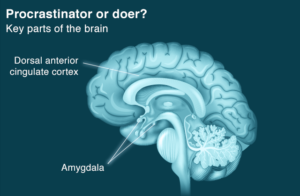
Let’s take a look at what’s going on in our brains when we procrastinate. Researchers have found that the brain activity of people who procrastinate is different from the brain activity of people who don’t procrastinate.
People who procrastinate tend to have more activity in the areas of the brain associated with pleasure and rewards. This may be why they are more likely to indulge in activities that give them instant gratification. Such as watching television or playing video games.
People who don’t procrastinate tend to have more activity in the areas of the brain associated with self-control and inhibition. This may be why they are less likely to indulge in these types of activities.
The Key Message
It means that we need to be aware of the activities that are causing our brain activity to increase. If we know that these activities are causing us to procrastinate, then we need to find a way to replace them with tasks that will help us achieve our goals.
Books and Movies
There are many books and movies about overcoming procrastination. These can be a great source of inspiration and motivation.
Some examples include:
“The Power of Intention: Learning to Co-Create Your World Your Way” by Wayne Dyer
“Eat That Frog!: 21 Great Ways to Stop Procrastinating and Get More Done in Less Time” by Brian Tracy
“The Now Habit: A Strategic Program for Overcoming Procrastination and Enjoying Guilt-Free Play” by Neil Fiore
“The Procrastination Equation: How to Stop Putting Things Off and Start Getting Stuff Done” by Piers Steel
Conclusion
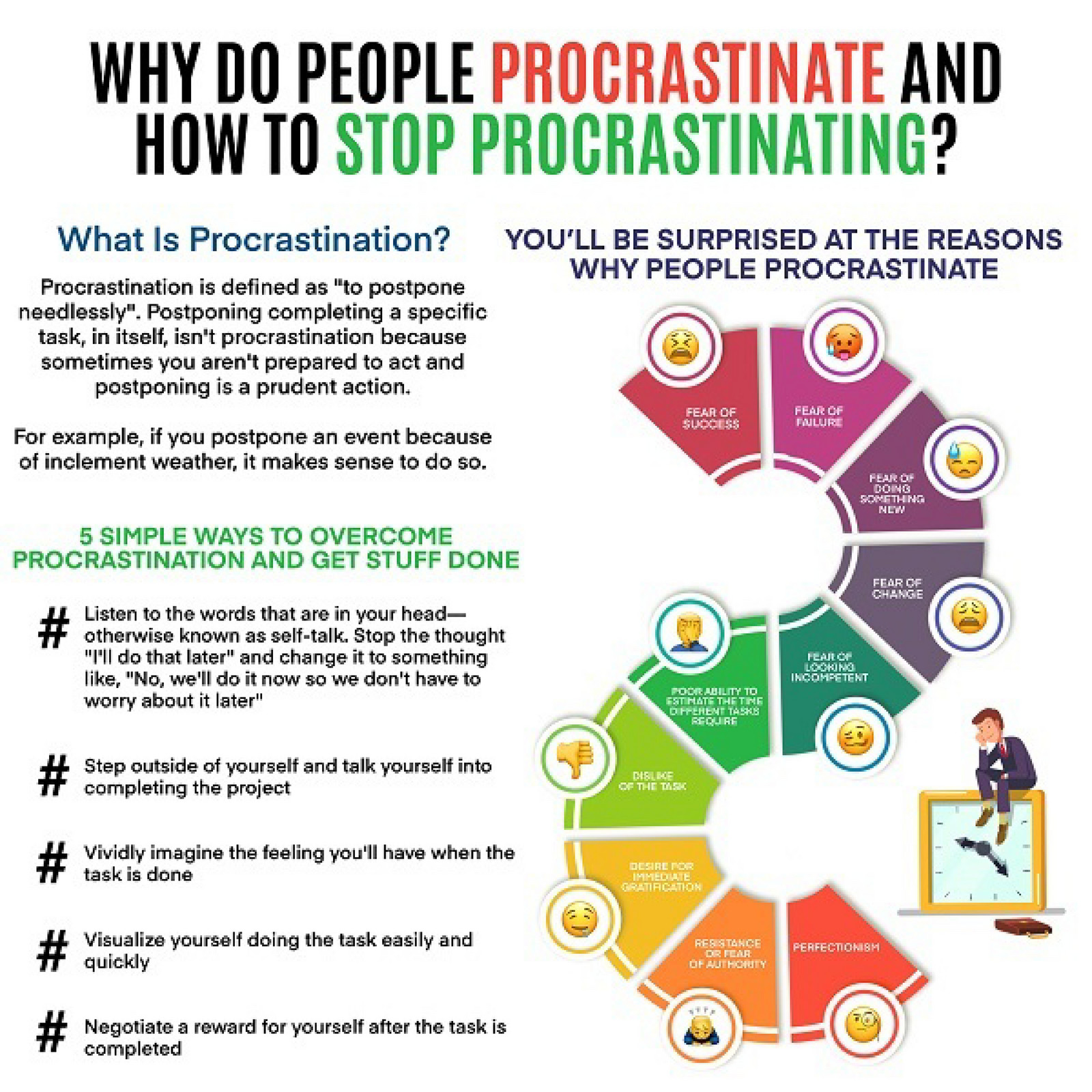
We hope that this article has helped you better understand why you procrastinate and how to overcome it. Remember, the best way to overcome procrastination is to take small steps and break the task down into smaller chunks. If you need help, don’t be afraid to seek out professional help. There are many therapies available that can help you overcome your procrastination. Thanks for reading!
A Word From Therapy Mantra
Your mental health — Your psychological, emotional, and social well-being — has an impact on every aspect of your life. Positive mental health essentially allows you to effectively deal with life’s everyday challenges.
At TherapyMantra, we have a team of therapists who provide affordable online therapy to assist you with issues such as depression, anxiety, stress, workplace Issues, addiction, relationship, OCD, LGBTQ, and PTSD. You can book a free therapy or download our free Android or iOS app.
